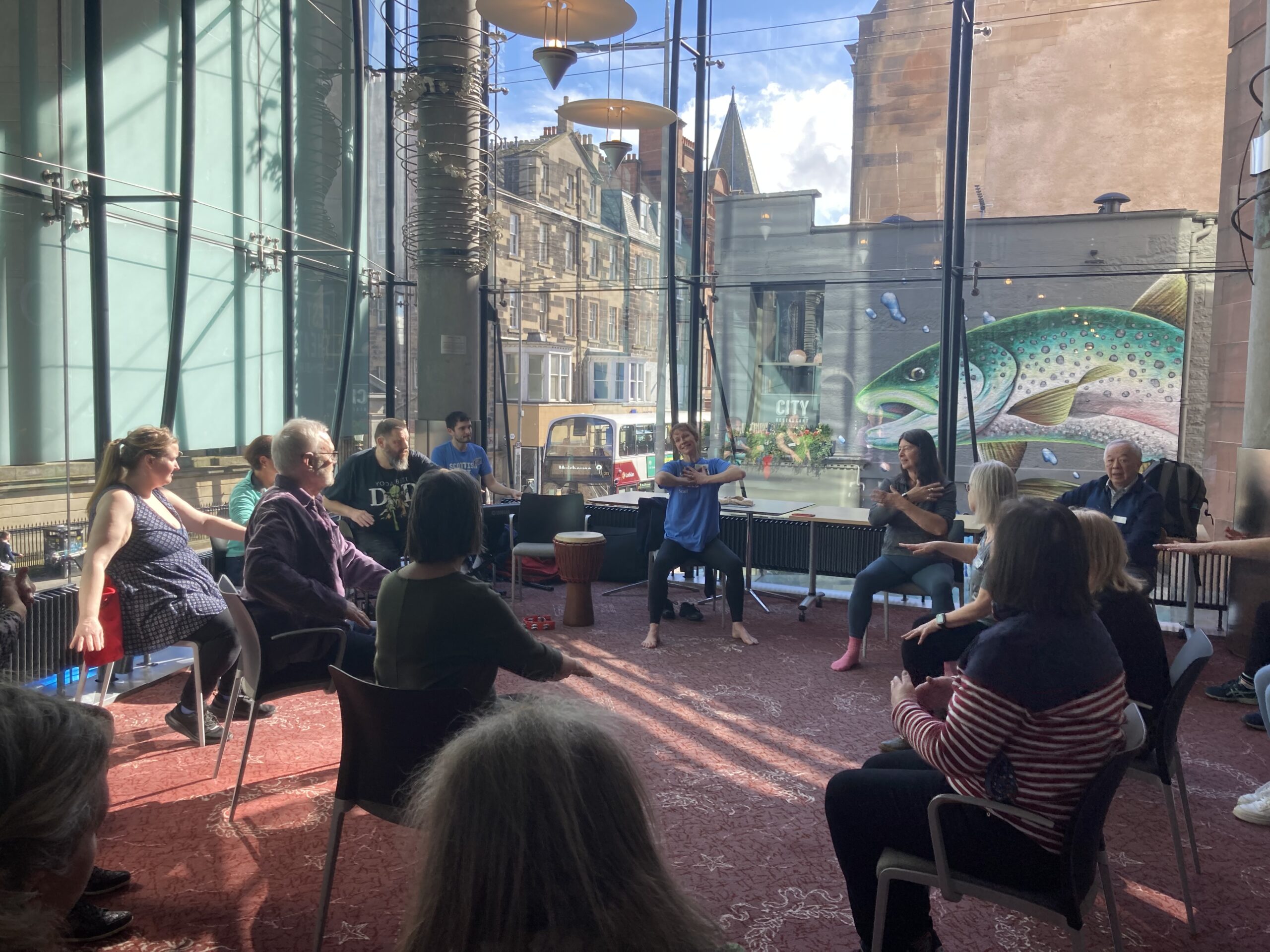On Thursday 23rd March 2023, we were delighted to facilitate a 1-day workshop at the Festival Theatre in Edinburgh as part of our CREATE Dance for Dementia project. The project aims to Cocreate a REsearch Agenda To facilitate Equitable (CREATE) Dance for Dementia, and 50 people attended the workshop. This included those living with dementia, carers and family members, health and social care professionals, dance organisational representatives, dancers, researchers and students. The day was a mixture of practical dance activities, break-out rooms on research topics, and presentations. In this blog, we share what happened on the day and outline plans for the next steps of our research on this exciting topic.
This project is funded by the Royal Society of Edinburgh and led by Dr Katey Warran at ECRED in partnership with Scottish Ballet and Dance Base (Scotland’s National Centre for Dance). Our core project team also includes Martin Robertson (lived experience researcher) and Pilar Letrondo (researcher at UCL). To learn more about the wider project, please visit the ECRED website.
Keynote lecture
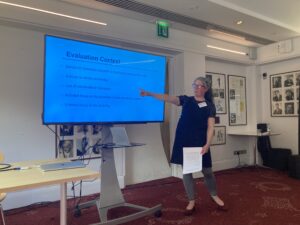
The day began with a keynote lecture from Dr Bethany Whiteside (Research Lecturer and Doctoral Degrees Coordinator, Royal Conservatoire of Scotland). Bethany talked about the evaluation of the Time to Dance® programme at Scottish Ballet, sharing findings of the evaluation in relation to: 1) Autonomy 2) Collaboration 3) Creativity and 4) Dignity. The dance classes promoted individual and community wellbeing and fostered a sense of collaboration and ownership. Bethany ended her presentation with a call for future research in Dance for Dementia to focus on ensuring collaboration in research processes and the role of dance itself as an evaluation method.
Break-out groups
Throughout the day, there were three break-out group options:
- Visually mapping research priorities
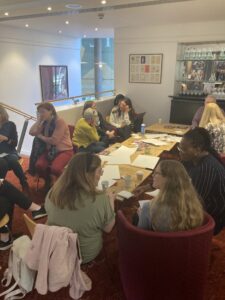 In this session we used the prompts of ‘who’ ‘what’ ‘where’ and ‘why’ to map out what we believe the future priorities in dance for dementia research should be. Priorities included exploring:
In this session we used the prompts of ‘who’ ‘what’ ‘where’ and ‘why’ to map out what we believe the future priorities in dance for dementia research should be. Priorities included exploring:
- Using dance to explore empathy and shared values (e.g., being understood, mirroring techniques)
- The role of music in dance processes (e.g., personalised music, communicating with music)
- How to improve access to dance for dementia classes (e.g., the language used to promote classes, marketing, psychological barriers)
- How dance could be integrated into care home settings (e.g., staff culture and social and logistical issues)
- The role of technology in dance engagement (e.g., VR, digital information, hybrid dance classes)
- Using dance to explore continuity of care (e.g., building trust, personalised consistent care)
- Curating culturally-sensitive dance programmes (e.g., addressing diversity and inclusion)
- Supporting pre-existing community dance programmes to be dementia inclusive
2. Telling your story of equity and inclusion
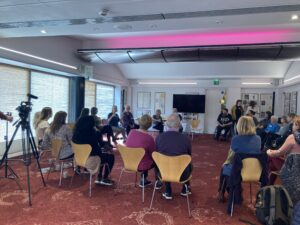 In this session, we explored experiences of being involved in research using narrative and poetry techniques. One exercise included being asked what first comes to mind when hearing the words ‘research’, what research ‘should be’ and how one would ‘like to feel’ when participating in research. Example responses included that research is ‘something new’ and can prompt ‘connectivity’ but it can also be ‘overly complicated’ and make one feel like a ‘lab rat’. In relation to what research should be and feel like, words such as ‘fun’, ‘inspiring’ and ‘honest’ were used, alongside expressions that research should make one feel ‘valued’ and ‘part of something’. There were also discussions regarding what makes someone ‘a researcher’. These prompts were also used to make poetry and one example is included here:
In this session, we explored experiences of being involved in research using narrative and poetry techniques. One exercise included being asked what first comes to mind when hearing the words ‘research’, what research ‘should be’ and how one would ‘like to feel’ when participating in research. Example responses included that research is ‘something new’ and can prompt ‘connectivity’ but it can also be ‘overly complicated’ and make one feel like a ‘lab rat’. In relation to what research should be and feel like, words such as ‘fun’, ‘inspiring’ and ‘honest’ were used, alongside expressions that research should make one feel ‘valued’ and ‘part of something’. There were also discussions regarding what makes someone ‘a researcher’. These prompts were also used to make poetry and one example is included here:
Everybody is a researcher
Everybody is a researcher.
I learn from everything I do in my life.
We are all doing research all the time.
It shouldn’t cost you to participate.
My experience should be respected.
It shouldn’t cost you to participate.
Everybody is a researcher.
I learn from everything I do in my life.
We are all doing research all the time.
I shouldn’t have to make it make sense.
It should have clear steps for implementation.
I shouldn’t have to make it make sense.
Everybody is a researcher.
I learn from everything I do in my life.
We are all doing research all the time.
3. Using dance to express and communicate
For this break-out, we explored how dance can be used as a way to express feelings, tell stories and communicate. Facilitators from Scottish Ballet (Lisa Sinclair) and Dance Base (Emma Smith) explored the stories that dance might be able to tell about living with dementia and how dance may be a form of communication to express feelings. We told short movement ‘stories’ and created characters using movement.
Dance activities
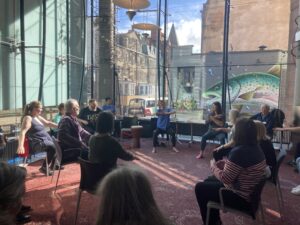 There were also two practical dance sessions to engage in throughout the day: one led by Dance Base and one by Scottish Ballet. The sessions were active and fun!
There were also two practical dance sessions to engage in throughout the day: one led by Dance Base and one by Scottish Ballet. The sessions were active and fun!
Looking to the future
The CREATE team are now bringing together the ideas that were put forward in the workshop described here to form the foundation of our cocreated research agenda. We also want to bring in more people, experiences and ideas as we develop this, so we are hosting a second, online workshop to engage nationally and internationally. The second workshop is planned for Tuesday 20th June 1-3pm (online) and will include discussions and creative activities, as well as a short film screening of activities and learnings from our first workshop. If you are interested in joining us, please click here to sign up.
